Published Mar 29, 2023
The Radical Empathy of Deanna Troi
For too long women were written as overly emotional, with reactions that would devour and destroy them. Then came Deanna Troi.

StarTrek.com
Of all Star Trek: The Next Generation’s top-notch, all-thriller, no-filler cast of characters, Deanna Troi is perhaps one of the more under-appreciated, despite appearing in all seven seasons, the TNG films, and even a few Star Trek: Voyager episodes. Though she was omnipresent through much of the series, the focus seldom fell on her. Yet, when it did, her cultivation of radical empathy towards others made for some of the most interesting episodes in Star Trek canon.
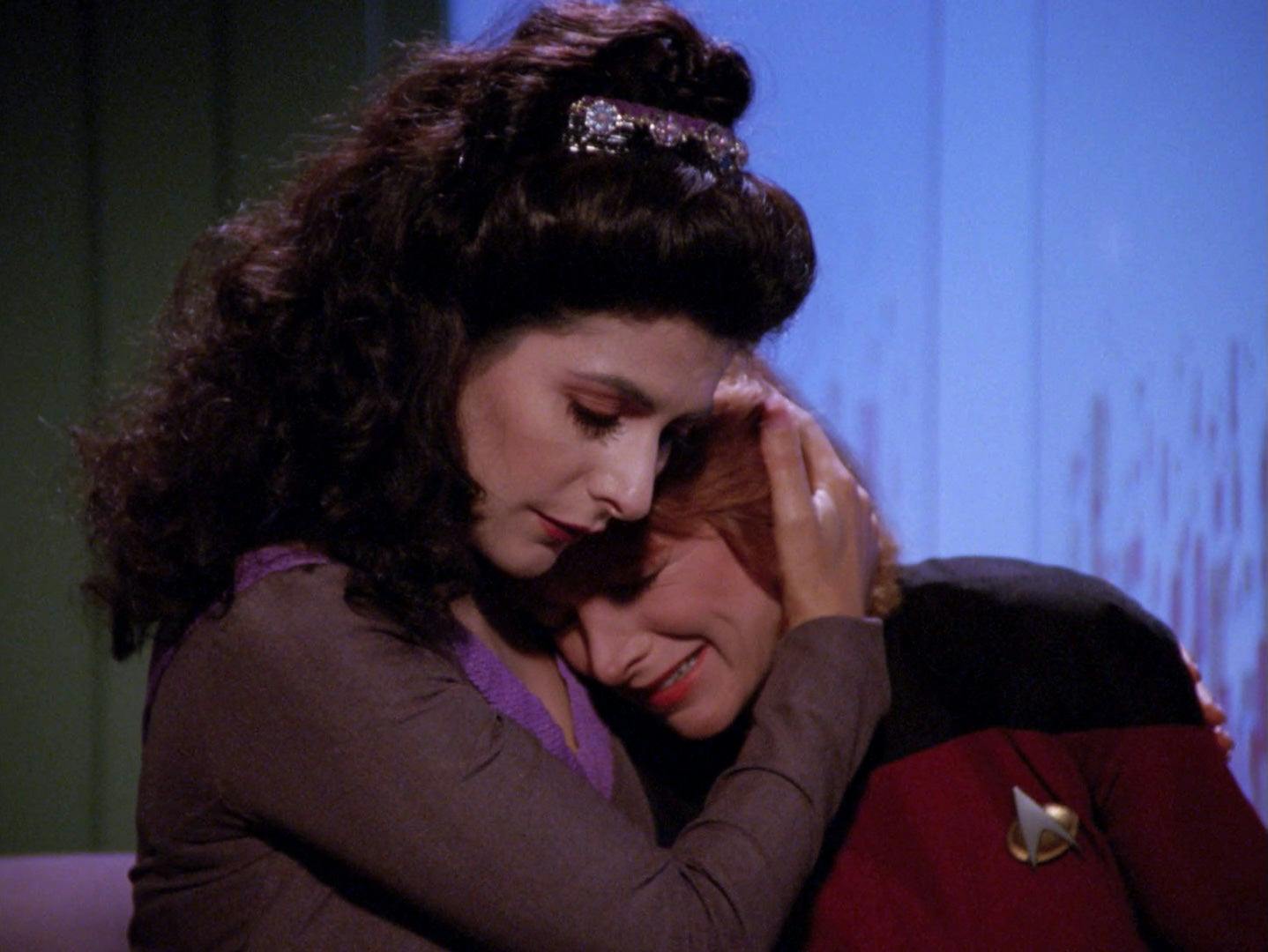
StarTrek.com
Powerful women who were able to maintain their power and remain at the forefront of genre television were few and far between in decades past. But Troi, a Betazoid empath so powerful that her range extends beyond the bounds of the ship she travels on, shows that people who are guided by their hearts actually have a bit of an edge in life. In a lot of fiction, women’s emotions devour and destroy them. And empaths and telepaths in fiction, especially, are often portrayed like Raven from the Teen Titans or Jean Grey of the X-Men, both of whom undergo extensive trauma, are incredibly unstable, and prone to losing control or murdering their teammates. That’s never the case with Troi.
Yet, it is in the episodes in which Troi struggles and shows her dark side that we begin to understand who she is and why her journey is so important among a cast of important stories. In “The Loss,” we see Troi losing her powers in the first few moments of the episode. Her bad side is on full display, but she’s still just fascinating despite generally acting like an unruly teenager for much of her time on-screen. This episode showed a tremendous amount of growth by targeting and suspending the thing that Deanna relies on for everything — her intuition. By inhibiting her ability to empathize, the threat of the week showed us how the generally brave and calm Deanna deals without her own supreme inner harmony. The answer is, not great, but isn’t that more relatable? Much of Deanna’s life is tied up in her level of pride in her work and feeling like her work was to be discontinued shattered her (for one episode).
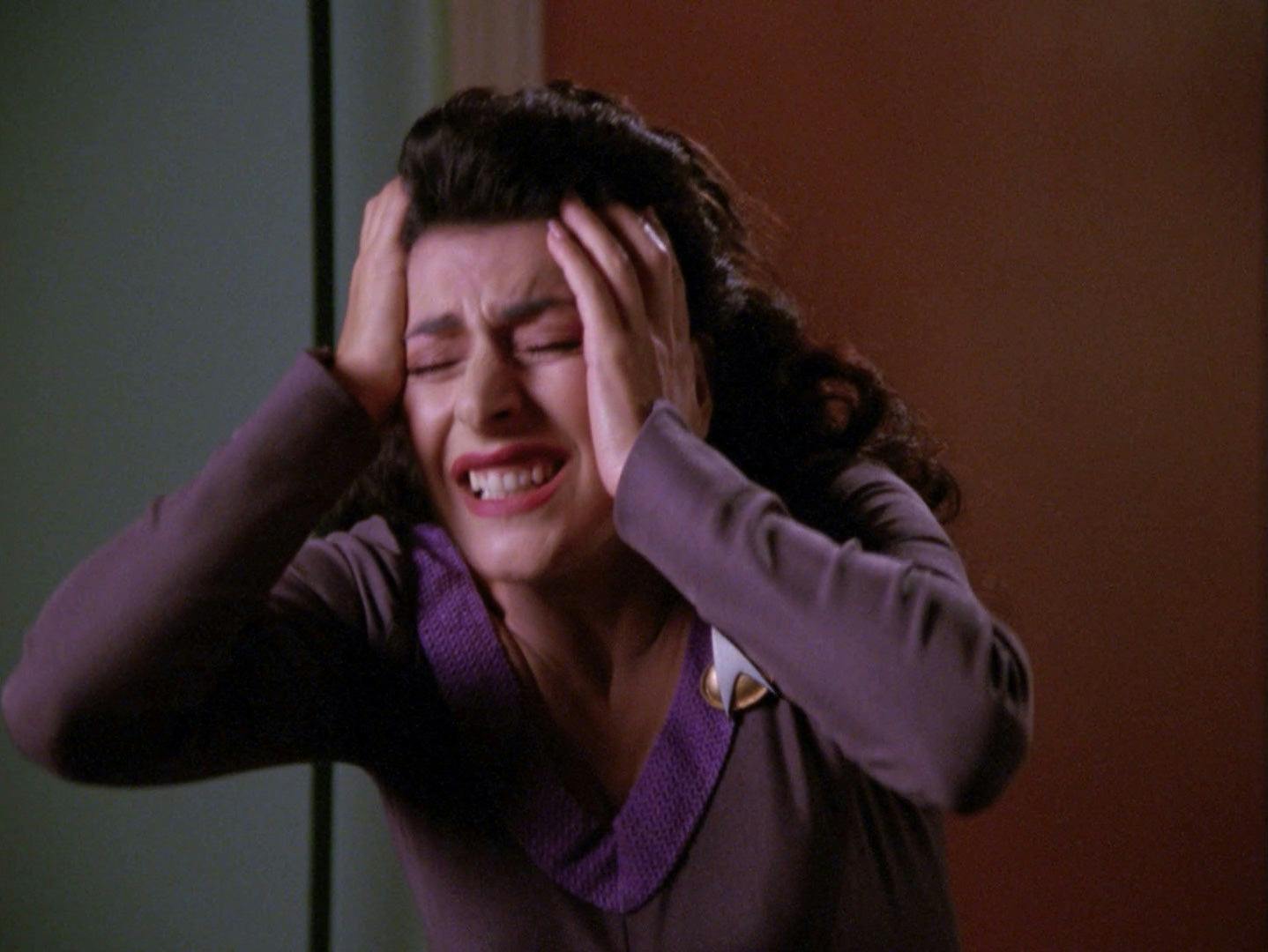
StarTrek.com
Her self-loathing towards her human heritage comes into play as Riker calls her out for secretly feeling like humans were in some way less perceptive and even somehow stunted. He observes that her edge of control, or even an underlying sense of superiority, is gone without her empathetic senses. Deanna continues to push him away, and the generally brash Riker shows a deep patience and acceptance of her struggle. He’s able to look past her words and see how scared she is, and he refuses to let her go through it alone.
We see Troi’s full temper here for maybe the first time. She’s convinced everyone is condescending to her and is completely unable to deal with that emotionally. The episode demonstrates that Troi’s sense of self-awareness is so important to her that she is willing to walk away from everyone out of a refusal to become a burden for the Enterprise. She refuses to recognize her crewmates’ sympathy and instead views it as pity. The threat of dependency terrifies her, and this is where we start to understand a deep sense of personal responsibility in Troi that can easily pass the threshold of self-abuse. Though misguided and even somewhat sad, Deanna’s sense of pride and her struggle to reconcile it will stand out to a lot of people who hold themselves to a perfectionist extreme.
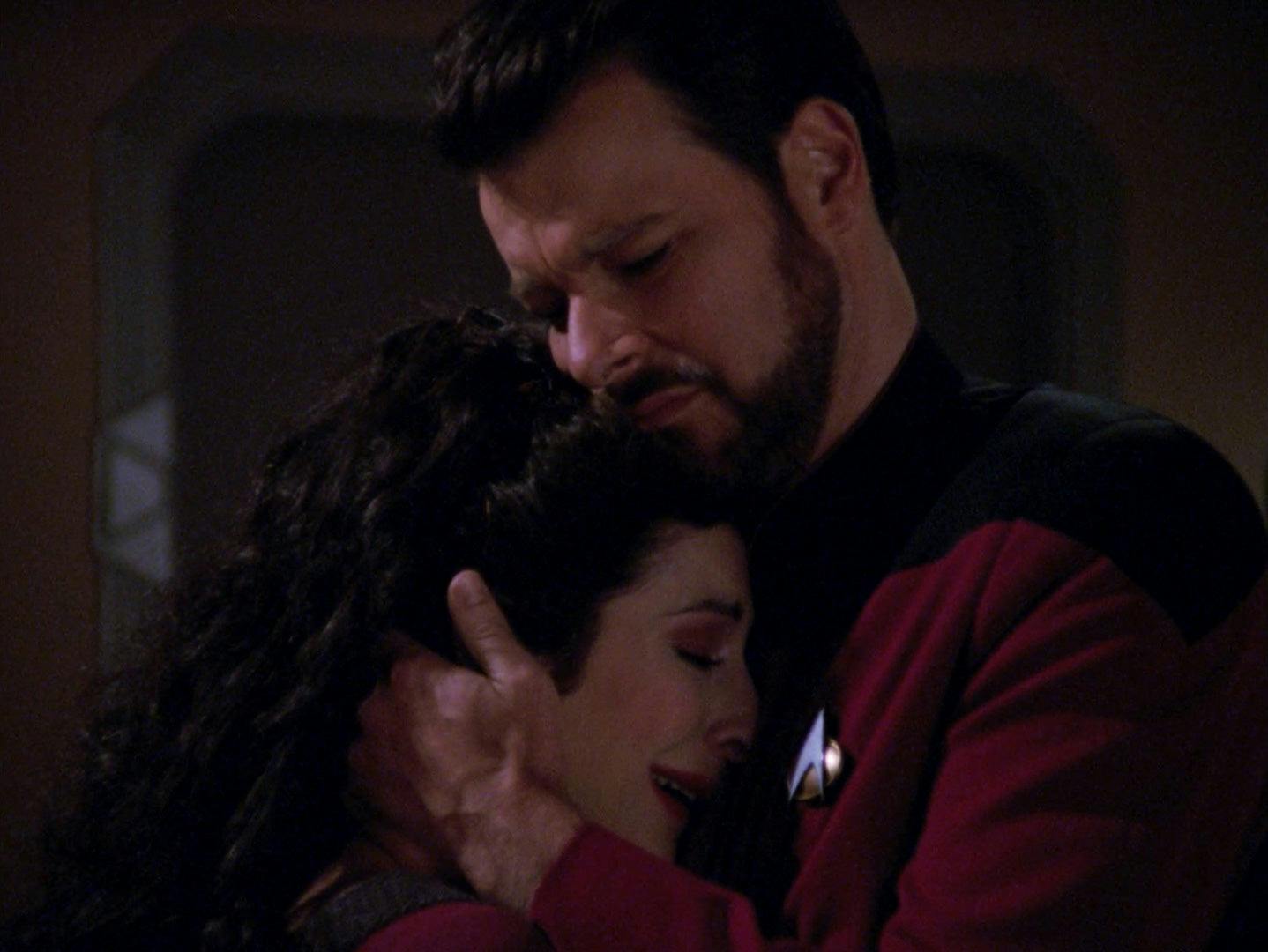
StarTrek.com
Troi is sharp with everyone in “The Loss.” She refuses to allow Picard to genuinely sympathize with her, instead shutting him down and accusing him of placating her. When Dr. Crusher is gentle and honest with Troi that she might not regain her empathy, Troi becomes annoyed and snaps at her. Crusher insists she doesn’t want to give Troi false hope, to which Troi sharply responds, “It’s just hope, Beverly, not false hope.” She repeatedly tells the people around her that they can’t hope to understand what she’s going through despite their active attempts to do so.
Though not always directed in the right places, Troi’s sharp sense of outrage is always lovely to see. For someone who prides herself on her ability to remain calm, she is still a flawed person. She gets mad, she loses patience, she condescends, and, maybe worst of all for a counselor, she sometimes calls people out on their feelings before they’re ready to talk about them. Yet, she’s also someone who really comes into her own as far as drawing boundaries goes. In a way, this all only makes Troi more relatable. Most intensely empathetic people struggle with boundaries throughout much of their early lives, but we always can, and often do, get better at developing those important parameters as we go along.
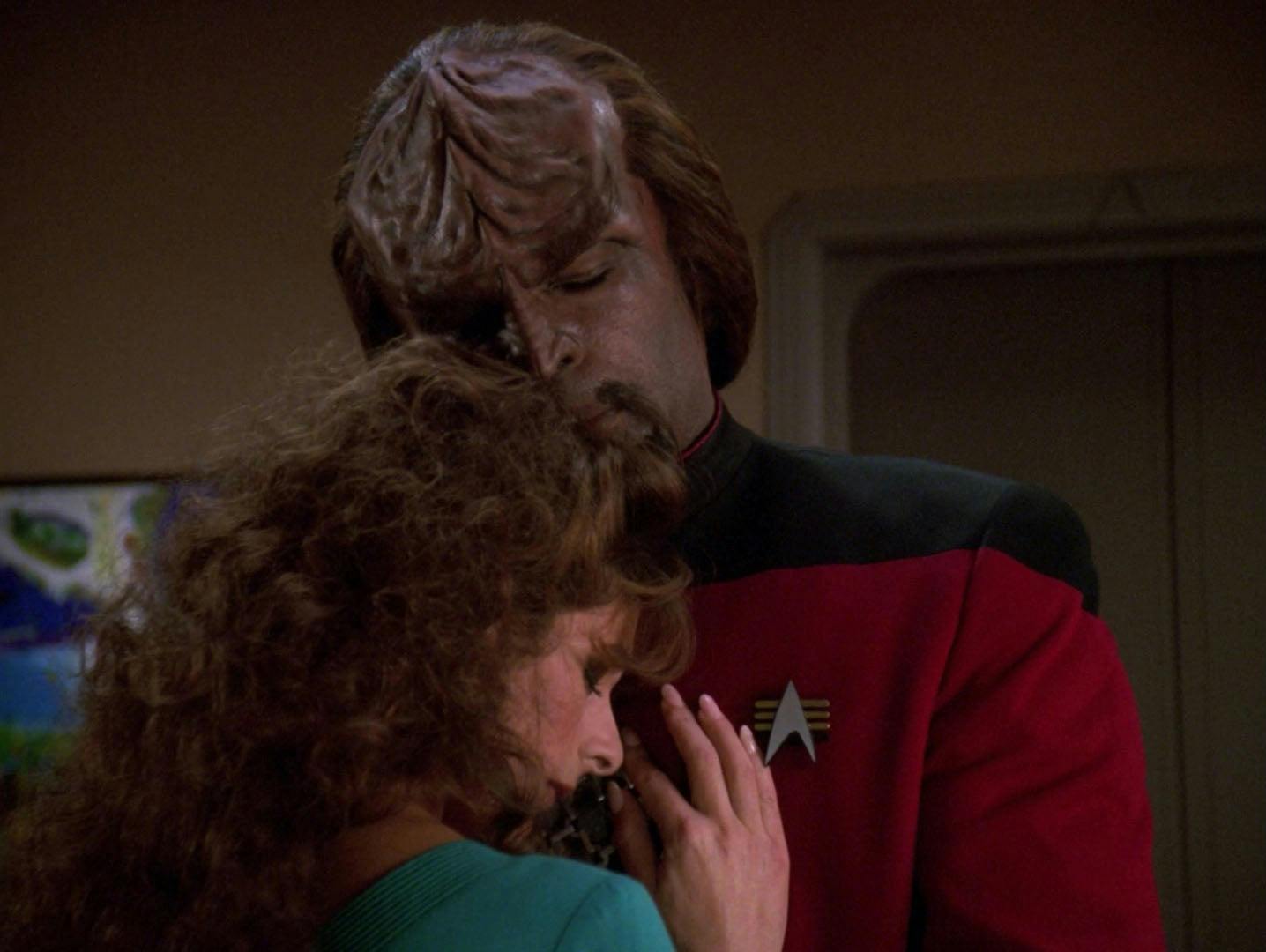
StarTrek.com
Troi’s often unacknowledged inner struggle is part of why her relationships with the rest of the crew are so fascinating. For instance, her relationship with Worf was one of the better parts of both of their character arcs. These are two people that, at first glance, would seem to have little in common with each other outside the Enterprise, but this is where we saw an emphasis on their substantial emotional common ground. Both are incredibly loyal, prideful, and easily angered, but both are also deeply gentle spirits that struggle with violence on a profound and often unspoken level. Though he isn’t always forthcoming, Worf is easily one of the most emotional people on the crew. Troi’s light pushing of Worf to be more open, honest, and communicative about his many feelings helped Worf. Meanwhile, his passion and sense of honor gave Troi the stable foundation she needed to express her interest in him. Though short-lived, this relationship was better than a lot of people give it credit for because it helped us see both characters through a new lens.
Even when platonic, Troi’s relationships are a shining part of TNG. Picard regularly depends on Troi and leans on her advice; throughout the series, she is one person who always challenges him. By forcing Picard to stay in touch with difficult-to-face feelings and getting him to confront things that he is instinctively prone to overlook, she is a major asset for the captain who is guided by a ceaseless inner certainty. In listening to Troi, Picard becomes a better, more compassionate commander. Meanwhile, her deeply felt interactions with the painfully intentional Crusher and her ability to meet Data and Geordi at their goofiest led to some of the best moments of the series. Troi is a character that improves the entire cast in often subtle ways.
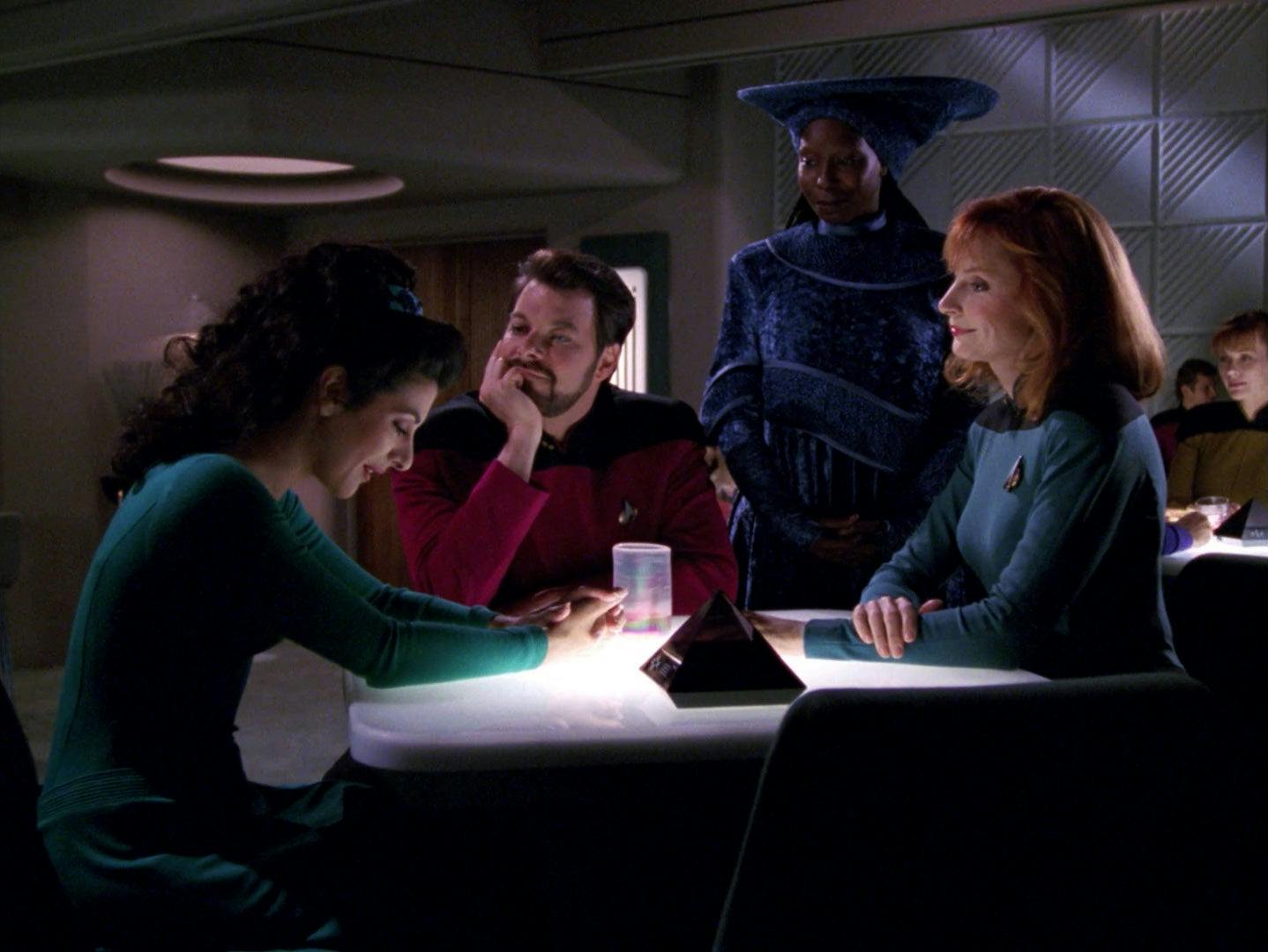
StarTrek.com
We live in a society that views compassion as a weakness, particularly feminine compassion. The message that to care is to give up your strength is instilled through media, culture, even in the mechanics of our very language. Allowing yourself to feel the world with one or two degrees less of a protective layer around your heart takes courage, and courage takes power. Like many highly sensitive people, Deanna Troi is regularly underestimated and her importance reduced. Through her patience and understanding, Troi insists that forcing yourself to view the world with empathy makes you a stronger person, not a weaker one.
This article was originally published on September 10, 2019.
Sara Century (she/her) is an artist, writer, and filmmaker who is obsessed with most things. She is good at speaking in public, volunteering her time to various causes, working for most hours of her waking life, and saying quotable things in casual conversation. Keep up with her at www.saracentury.com and on Twitter @saracentury.
Stay tuned to StarTrek.com for more details! And be sure to follow @StarTrek on Facebook, Twitter, and Instagram.

